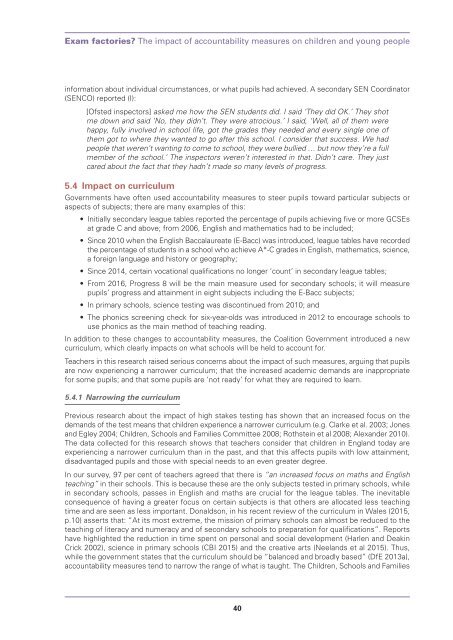exam-factories
exam-factories
exam-factories
You also want an ePaper? Increase the reach of your titles
YUMPU automatically turns print PDFs into web optimized ePapers that Google loves.
Exam <strong>factories</strong>? The impact of accountability measures on children and young peopleinformation about individual circumstances, or what pupils had achieved. A secondary SEN Coordinator(SENCO) reported (I):[Ofsted inspectors] asked me how the SEN students did. I said ‘They did OK.’ They shotme down and said ‘No, they didn’t. They were atrocious.’ I said, ‘Well, all of them werehappy, fully involved in school life, got the grades they needed and every single one ofthem got to where they wanted to go after this school. I consider that success. We hadpeople that weren’t wanting to come to school, they were bullied … but now they’re a fullmember of the school.’ The inspectors weren’t interested in that. Didn’t care. They justcared about the fact that they hadn’t made so many levels of progress.5.4 Impact on curriculumGovernments have often used accountability measures to steer pupils toward particular subjects oraspects of subjects; there are many <strong>exam</strong>ples of this:• Initially secondary league tables reported the percentage of pupils achieving five or more GCSEsat grade C and above; from 2006, English and mathematics had to be included;• Since 2010 when the English Baccalaureate (E-Bacc) was introduced, league tables have recordedthe percentage of students in a school who achieve A*-C grades in English, mathematics, science,a foreign language and history or geography;• Since 2014, certain vocational qualifications no longer ‘count’ in secondary league tables;• From 2016, Progress 8 will be the main measure used for secondary schools; it will measurepupils’ progress and attainment in eight subjects including the E-Bacc subjects;• In primary schools, science testing was discontinued from 2010; and• The phonics screening check for six-year-olds was introduced in 2012 to encourage schools touse phonics as the main method of teaching reading.In addition to these changes to accountability measures, the Coalition Government introduced a newcurriculum, which clearly impacts on what schools will be held to account for.Teachers in this research raised serious concerns about the impact of such measures, arguing that pupilsare now experiencing a narrower curriculum; that the increased academic demands are inappropriatefor some pupils; and that some pupils are ‘not ready’ for what they are required to learn.5.4.1 Narrowing the curriculumPrevious research about the impact of high stakes testing has shown that an increased focus on thedemands of the test means that children experience a narrower curriculum (e.g. Clarke et al. 2003; Jonesand Egley 2004; Children, Schools and Families Committee 2008; Rothstein et al 2008; Alexander 2010).The data collected for this research shows that teachers consider that children in England today areexperiencing a narrower curriculum than in the past, and that this affects pupils with low attainment,disadvantaged pupils and those with special needs to an even greater degree.In our survey, 97 per cent of teachers agreed that there is “an increased focus on maths and Englishteaching” in their schools. This is because these are the only subjects tested in primary schools, whilein secondary schools, passes in English and maths are crucial for the league tables. The inevitableconsequence of having a greater focus on certain subjects is that others are allocated less teachingtime and are seen as less important. Donaldson, in his recent review of the curriculum in Wales (2015,p.10) asserts that: “At its most extreme, the mission of primary schools can almost be reduced to theteaching of literacy and numeracy and of secondary schools to preparation for qualifications”. Reportshave highlighted the reduction in time spent on personal and social development (Harlen and DeakinCrick 2002), science in primary schools (CBI 2015) and the creative arts (Neelands et al 2015). Thus,while the government states that the curriculum should be “balanced and broadly based” (DfE 2013a),accountability measures tend to narrow the range of what is taught. The Children, Schools and Families40


